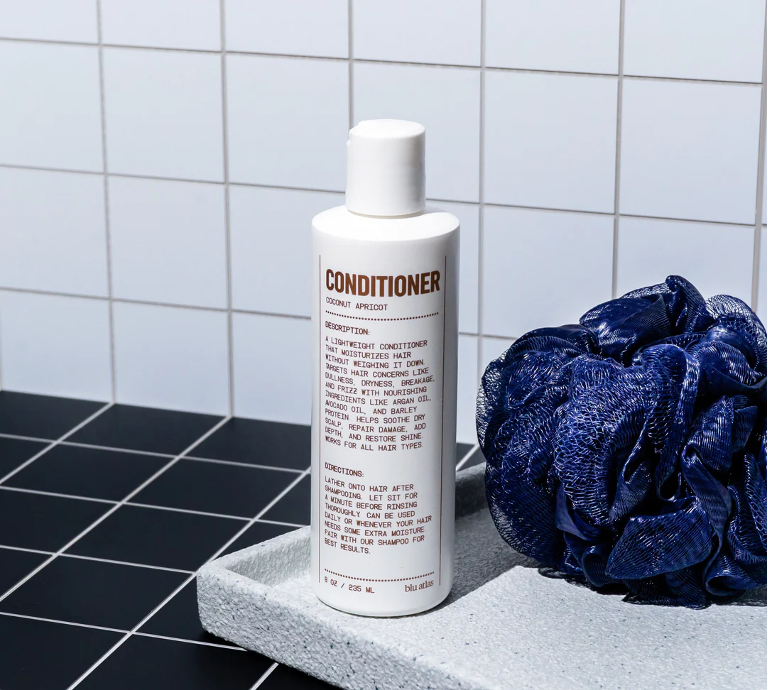If you’ve noticed “vegan” labels every time you shop online or in-store, you might be starting to wonder, “Should I switch to vegan grooming products?” and “What are they?”. (The answer is yes, you should switch to vegan products).
Vegan conditioners and other products, such as shampoo, body lotion, face moisturizer, body wash, and more, contain gentler, more effective formulas that provide incredible benefits for your skin and hair.
The wellness industry has taken notice of these superior formulas and the public’s desire for more vegan formulas, and the vegan cosmetics market is expected to rise by more than a billion dollars from 2023 to 2024. Yes, one billion with a b.
In this article, we’ll explore vegan conditioner, how to choose the right product for your hair, and how to use it effectively.
What is Vegan Conditioner?
Vegan conditioner is a moisturizing hair treatment that does not contain animal ingredients or animal-derived materials like honey, beeswax, collagen, or lanolin. Currently, there is no FDA definition for the term “vegan.”
Like other traditional conditioners, a vegan conditioner’s job is to add moisture to your hair using oils and emollients to restore stressed hair after cleansing.
Vegan skin and hair care products use plant-based ingredients to help your skin or hair without harming animals. Many dermatologists recommend using vegan grooming products because they are gentler on the skin and a safer option for those with dry or sensitive skin.
Benefits of Choosing a Vegan Conditioner
There are many benefits to switching to vegan self-care products. Here are the top three reasons to make the switch:
- Better for the environment: Vegan formulas don’t just remove animal ingredients; they also cut out harsh “filler” chemicals and ingredients. Vegan products use fewer synthetic chemicals, which means they’re typically less harmful to the environment and have a much lower chance of contaminating water, soil, and air.
- Healthier for your hair: Vegan beauty products are full of plant-based ingredients that are good for your hair and skin. They typically don’t include harsh ingredients like sulfates, parabens, artificial fragrances, phthalates, and synthetic dyes. These ingredients are common irritants to the hair and skin and cause issues like dryness, redness, flaky scalps, and more.
- Ethical considerations: Vegan formulas don’t use animal ingredients, and most are cruelty-free. If animal welfare is important to you, consider switching to grooming products with cruelty-free and vegan labels.
Key Ingredients to Look for in a Vegan Conditioner
If you want hydrated, frizz-free hair, a vegan conditioner is the answer. It’s packed with nutrient-dense, plant-based ingredients that add moisture and shine, inject volume, restore breakage, and more.
Here are the ingredients to look for in vegan conditioner:
- Aloe vera
- Argan oil
- Avocado oil
- Chamomile
- Coconut oil
- Green tea
- Jojoba oil
- Lavender oil
- Tea tree oil
- Vegan biotin
- White tea
Ingredients like those listed above work hard to replenish the hair and add much-needed moisture.
The Best Vegan Conditioner for All Hair Types

Blu Atlas Conditioner is a vegan conditioning formula that satisfies all hair types and concerns, including frizz, breakage, dryness, and more. It’s free from harsh chemicals like parabens, sulfates, phthalates, and artificial fragrances—and, of course, it’s also cruelty-free.
Vegan Conditioner from Blu Atlas is a lightweight, nourishing blend of naturally derived ingredients that targets issues like dullness, frizz, dryness, and breakage. The ultra-nourishing ingredients work together to restore hair and ensure it feels healthy. Argan oil, white tea extract, barley protein, and avocado oil are the dream team that keeps your hair full of shine and moisture.
How to Use Vegan Conditioner Effectively
Get the most from your vegan conditioning treatment by following our simple grooming tips.
Tips for Applying Vegan Conditioner
It’s time for hydrated locks.
- Step into the shower and thoroughly shampoo your hair. (Don’t skip this step unless you’re co-washing hair with conditioner.)
- Get a dime to quarter-sized amount of product and spread it from the mid-length of hair to the tips.
- Distribute it evenly and allow it to soak into your strands for two to five minutes.
- Rinse it out with cool or lukewarm water.
Choose Complementary Products
If you’re following a standard weekly haircare routine, you’ll need a few additional products to help your hair look vibrant. You’ll want to pair a vegan conditioner with other vegan products. 
We recommend finding a vegan shampoo and conditioner duo like Blu Atlas’s cleansing and hydrating team—available in the Shower Bundle, which also includes a stellar vegan body wash—to ensure your hair stays healthy and vibrant.
Follow up with other styling tools or products like a hair volumizer or gel.
Frequently Asked Questions
What does vegan conditioner mean?
Vegan conditioner is not made with animal-derived ingredients. Most vegan self-care products are cruelty-free, which means no animals were harmed during testing or production.
How often should I use vegan conditioner?
You should use conditioner after every time you shampoo your hair. If you’re following a typical hair care routine, you may use a vegan conditioner two to three times per week.
